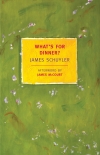What's for Dinner? by James Schuyler (diy ebook reader txt) 📗

- Author: James Schuyler
Book online «What's for Dinner? by James Schuyler (diy ebook reader txt) 📗». Author James Schuyler
The vision I’d conjured up turned What’s for Dinner? into a script with pointed stage directions: a telling comedy involving the comically wayward Olympians, crossed with the idea of the television soap opera (to which genre a number of Schuyler’s friends had turned in order to make quantities of ready money). When he’d heard me out on the notion of bringing the Olympians down to earth and inserting them into the plot of As the World Turns, he smiled enigmatically and said, “Well, you know, dear, tutto il mondo e un palco scenico.” (All the world’s a stage.)
On the palco scenico of What’s for Dinner? The classical world and Christianity and nostalgia and the funny pages and even camp along the lines of the underground queer novel Whisper His Sin (and the he’s Jimmy Schuyler hung with did more than whisper) all gather, mingle, and combine in promiscuous and unexpected permutations in something very like an allegory of the poet/novelist’s soul. (John Keats, the one Romantic poet Schuyler resembles, called every man’s life an allegory.) In the community-theater production of the book I picture, Norris Taylor, all rakish aplomb and relentless equanimity, is a natural Jove. (As Mary Charlotte puts it, “Norris tends to expect the worst, and as that rarely happens, he doesn’t get upset to easily.“) The twins, for their part, take on Castor and Pollux, slipping, always hungry, in and out of the book, leading the way for their elders, themselves hot to trot (or tout the trotters) from the sidelines.
And yet if boys will be boys, these two wayward boys are also uncanny presences. Twins are always that. One of the dioscouri was immortal Castor, the angelic aspirant; the other, earthbound, mortal Pollux, imbued with those aspects or functions of desire which will operate as if they are indeed timeless and immortal (whereas they are merely perennial and vital). It is the intrapsychic melodrama of the poet and his double, hardly distinguishable from the symptoms of paranoid schizophrenia. “ ‘Symptoms of what?’ Mr. Mulwin demanded. ‘Of a nature not at home with itself,’ Dr. Kearney replied.”
And all the while, as real as a boy killer with an evil heart, not the majestic Lord of the Underworld, Hades himself, but what Andrew Solomon has named so well the Noonday Demon, known in classical antiquity as Pan, the genius of headlong madness, of slipping and falling, of malevolent hallucinations, of seizures that literally take the breath away, causing the heart to race in a vicious inversion of the excitement of romance, of agoraphobia (particularly when the marketplace has been less than kind in respect of authors’ livelihoods) and of the terror of being buried alive. If he is not in the pages of What’s for Dinner? in the guise of any one person, it is not because he is not there. He is always everywhere.
“Heavens, is it four o’clock already?”
Lottie hopped off the bed and accepted a small plastic cup from which she drank. The nurse made a face.
“I don’t know how you can stomach it, Mrs. Taylor, she said.
“The smell alone. . .”
“The funny thing about it,” Lottie said, “I’m afraid is that I’ve gotten to like it. I try not to breathe in people’s faces, but yesterday one of the patients turned quite pale and said ‘I smell embalming fluid!’ I explained that paraldehyde and formaldehyde smell alike, because they’re related. I’m afraid she thought for a while there that she was hallucinating.”
Thus it comes about that Mary Charlotte descends into an Underworld, where she remains for most of the duration of What’s for Dinner? Then, in a pattern congruent with Euripedes’ text as mediated by Eliot in The Cocktail Party, she makes the difficult journey upwards and home again, to ratify and secure her husband’s special position, his redemption purchased by her ordeal. (That witchy, conniving, podunk Aphrodite, Mag Carpenter, never had a chance against such steadfast devotion.)
And where does James Schuyler, the author of What’s for Dinner?, make his signature appearance? At the very end, in the person of the new patient on the night of the hospital fire.
He was a new patient and not been known to speak, in fact, his only notable act to date was pouring his oatmeal and milk on the floor, which he docilely cleaned up at the behest of a nurse. Lottie and the night’s excitement stirred him to speak. “Of glog,” he seemed to say.
It is entirely characteristic of Schuyler to say, by way of an indistinct grunt, “Just got here, dear,” when in fact he too (like Pan, but other-wise) has been nowhere else all along, waiting for us.
Oscar Wilde’s Miss Prism in The Importance of Being Earnest, when asked by Cicely Cardew, her charge, whether her long-lost three-volume novel ended happily, replies with satisfaction, “The good ended happily, the bad unhappily; that is what fiction means.” Barely a decade later Sigmund Freud had undertaken his radical transformation of the Western World, its volition and all its ideas, offering up the essential revelation which,





Comments (0)